 One of my motivations, I have to admit, for re-reading Moby Dick this year was my wife’s gift of Ahab’s Rolling Sea: A Natural History of Moby-Dick, by Richard J. King.I wanted to read the latter, and I’d been toying with the idea of reading the former.So I did both.King’s book explores the oceanic world introduced by Herman Melville’s classic.The various creatures and natural phenomena mentioned by Melville are examined in the light of what we now know today and a few key finding emerge.We continue to know little about our oceans, even as we deplete them.The book is about whales, but not only about whales.Anyone who’s read Moby Dick knows the novel encompasses about a year at sea and describes the many sights experienced by a crew that sets out with few port calls and many long hours on the open ocean.
One of my motivations, I have to admit, for re-reading Moby Dick this year was my wife’s gift of Ahab’s Rolling Sea: A Natural History of Moby-Dick, by Richard J. King.I wanted to read the latter, and I’d been toying with the idea of reading the former.So I did both.King’s book explores the oceanic world introduced by Herman Melville’s classic.The various creatures and natural phenomena mentioned by Melville are examined in the light of what we now know today and a few key finding emerge.We continue to know little about our oceans, even as we deplete them.The book is about whales, but not only about whales.Anyone who’s read Moby Dick knows the novel encompasses about a year at sea and describes the many sights experienced by a crew that sets out with few port calls and many long hours on the open ocean.
King does a fine job here.It’s particularly refreshing that he doesn’t hide from what he calls Melville’s natural theology.Many science writers fear to go to such places.Clearly Melville looked at the world through such lenses, however.The novel is one of the American philosophical masterpieces.Not only philosophical, but also theological.We can only guess what Melville’s true beliefs were, but he described the book to Nathaniel Hawthorne as wicked, and he knew that he was butting heads with orthodoxy throughout.Natural theology was, of course, an early form of science.Today scientists tend to be embarrassed by their heritage, but King shows that in the hands of a genius like Melville the results can be extraordinary.
This is also a disturbing book.Any volume dealing with the natural world these days likely is.The over-exploitation of the ocean, our use of it as a dumping ground, and global warming have combined to make the recovery of whales, as well as many other species, slow if not impossible.While commercial hunting of whales has largely ceased, the leviathans haven’t made much of a comeback, and several species are well on their way toward extinction.Sea birds are less common than they were when Melville was writing.We’ve influenced our world in such a bad way that we’ve likely set the clock ticking on the extinction of our own species.In a sense then, natural theology is facing its own apocalypse.Ahab’s Rolling Sea is not a dour book—it is a celebration of the world as it was once known, even if that world was less than just two hundred years ago.
